- Home
- Edith Wharton
The Reef
The Reef Read online
Produced by Gail Jahn, and John Hamm
THE REEF
by Edith Wharton
BOOK I
I
"Unexpected obstacle. Please don't come till thirtieth. Anna."
All the way from Charing Cross to Dover the train had hammered the wordsof the telegram into George Darrow's ears, ringing every change of ironyon its commonplace syllables: rattling them out like a discharge ofmusketry, letting them, one by one, drip slowly and coldly into hisbrain, or shaking, tossing, transposing them like the dice in some gameof the gods of malice; and now, as he emerged from his compartment atthe pier, and stood facing the wind-swept platform and the angry seabeyond, they leapt out at him as if from the crest of the waves, stungand blinded him with a fresh fury of derision.
"Unexpected obstacle. Please don't come till thirtieth. Anna."
She had put him off at the very last moment, and for the second time:put him off with all her sweet reasonableness, and for one of her usual"good" reasons--he was certain that this reason, like the other, (thevisit of her husband's uncle's widow) would be "good"! But it was thatvery certainty which chilled him. The fact of her dealing so reasonablywith their case shed an ironic light on the idea that there had been anyexceptional warmth in the greeting she had given him after their twelveyears apart.
They had found each other again, in London, some three monthspreviously, at a dinner at the American Embassy, and when she had caughtsight of him her smile had been like a red rose pinned on her widow'smourning. He still felt the throb of surprise with which, amongthe stereotyped faces of the season's diners, he had come upon herunexpected face, with the dark hair banded above grave eyes; eyes inwhich he had recognized every little curve and shadow as he would haverecognized, after half a life-time, the details of a room he had playedin as a child. And as, in the plumed starred crowd, she had stood outfor him, slender, secluded and different, so he had felt, the instanttheir glances met, that he as sharply detached himself for her. All thatand more her smile had said; had said not merely "I remember," but "Iremember just what you remember"; almost, indeed, as though her memoryhad aided his, her glance flung back on their recaptured moment itsmorning brightness. Certainly, when their distracted Ambassadress--withthe cry: "Oh, you know Mrs. Leath? That's perfect, for General Farnhamhas failed me"--had waved them together for the march to the dining-room,Darrow had felt a slight pressure of the arm on his, a pressure faintlybut unmistakably emphasizing the exclamation: "Isn't it wonderful?--InLondon--in the season--in a mob?"
Little enough, on the part of most women; but it was a sign of Mrs.Leath's quality that every movement, every syllable, told with her. Evenin the old days, as an intent grave-eyed girl, she had seldom misplacedher light strokes; and Darrow, on meeting her again, had immediatelyfelt how much finer and surer an instrument of expression she hadbecome.
Their evening together had been a long confirmation of this feeling. Shehad talked to him, shyly yet frankly, of what had happened to her duringthe years when they had so strangely failed to meet. She had told himof her marriage to Fraser Leath, and of her subsequent life in France,where her husband's mother, left a widow in his youth, had beenre-married to the Marquis de Chantelle, and where, partly in consequenceof this second union, the son had permanently settled himself. She hadspoken also, with an intense eagerness of affection, of her little girlEffie, who was now nine years old, and, in a strain hardly less tender,of Owen Leath, the charming clever young stepson whom her husband'sdeath had left to her care...
A porter, stumbling against Darrow's bags, roused him to the fact thathe still obstructed the platform, inert and encumbering as his luggage.
"Crossing, sir?"
Was he crossing? He really didn't know; but for lack of any morecompelling impulse he followed the porter to the luggage van, singledout his property, and turned to march behind it down the gang-way. Asthe fierce wind shouldered him, building up a crystal wall against hisefforts, he felt anew the derision of his case.
"Nasty weather to cross, sir," the porter threw back at him as they beattheir way down the narrow walk to the pier. Nasty weather, indeed; butluckily, as it had turned out, there was no earthly reason why Darrowshould cross.
While he pushed on in the wake of his luggage his thoughts slipped backinto the old groove. He had once or twice run across the man whom AnnaSummers had preferred to him, and since he had met her again he had beenexercising his imagination on the picture of what her married life musthave been. Her husband had struck him as a characteristic specimen ofthe kind of American as to whom one is not quite clear whether helives in Europe in order to cultivate an art, or cultivates an art as apretext for living in Europe. Mr. Leath's art was water-colour painting,but he practised it furtively, almost clandestinely, with the disdain ofa man of the world for anything bordering on the professional, whilehe devoted himself more openly, and with religious seriousness, to thecollection of enamelled snuff-boxes. He was blond and well-dressed, withthe physical distinction that comes from having a straight figure, athin nose, and the habit of looking slightly disgusted--as who shouldnot, in a world where authentic snuff-boxes were growing daily harder tofind, and the market was flooded with flagrant forgeries?
Darrow had often wondered what possibilities of communion there couldhave been between Mr. Leath and his wife. Now he concluded that therehad probably been none. Mrs. Leath's words gave no hint of her husband'shaving failed to justify her choice; but her very reticence betrayedher. She spoke of him with a kind of impersonal seriousness, as if hehad been a character in a novel or a figure in history; and what shesaid sounded as though it had been learned by heart and slightly dulledby repetition. This fact immensely increased Darrow's impression thathis meeting with her had annihilated the intervening years. She, who wasalways so elusive and inaccessible, had grown suddenly communicative andkind: had opened the doors of her past, and tacitly left him to draw hisown conclusions. As a result, he had taken leave of her with thesense that he was a being singled out and privileged, to whom she hadentrusted something precious to keep. It was her happiness in theirmeeting that she had given him, had frankly left him to do with as hewilled; and the frankness of the gesture doubled the beauty of the gift.
Their next meeting had prolonged and deepened the impression. They hadfound each other again, a few days later, in an old country house fullof books and pictures, in the soft landscape of southern England.The presence of a large party, with all its aimless and agitateddisplacements, had served only to isolate the pair and give them (atleast to the young man's fancy) a deeper feeling of communion, and theirdays there had been like some musical prelude, where the instruments,breathing low, seem to hold back the waves of sound that press againstthem.
Mrs. Leath, on this occasion, was no less kind than before; but shecontrived to make him understand that what was so inevitably coming wasnot to come too soon. It was not that she showed any hesitation as tothe issue, but rather that she seemed to wish not to miss any stage inthe gradual reflowering of their intimacy.
Darrow, for his part, was content to wait if she wished it. Heremembered that once, in America, when she was a girl, and he hadgone to stay with her family in the country, she had been out when hearrived, and her mother had told him to look for her in the garden. Shewas not in the garden, but beyond it he had seen her approaching down along shady path. Without hastening her step she had smiled and signed tohim to wait; and charmed by the lights and shadows that played upon heras she moved, and by the pleasure of watching her slow advance towardhim, he had obeyed her and stood still. And so she seemed now to bewalking to him down the years, the light and shade of old memories andnew hopes playing variously on her, and each step giving him the visionof a different grace. She did not waver or turn aside; he knew she wouldcome st
raight to where he stood; but something in her eyes said "Wait",and again he obeyed and waited.
On the fourth day an unexpected event threw out his calculations.Summoned to town by the arrival in England of her husband's mother, sheleft without giving Darrow the chance he had counted on, and he cursedhimself for a dilatory blunderer. Still, his disappointment was temperedby the certainty of being with her again before she left for France;and they did in fact see each other in London. There, however, theatmosphere had changed with the conditions. He could not say that sheavoided him, or even that she was a shade less glad to see him; butshe was beset by family duties and, as he thought, a little too readilyresigned to them.
The Marquise de Chantelle, as Darrow soon perceived, had the samemild formidableness as the late Mr. Leath: a sort of insistentself-effacement before which every one about her gave way. It wasperhaps the shadow of this lady's presence--pervasive even during heractual brief eclipses--that subdued and silenced Mrs. Leath. The latterwas, moreover, preoccupied about her stepson, who, soon after receivinghis degree at Harvard, had been rescued from a stormy love-affair, andfinally, after some months of troubled drifting, had yielded to hisstep-mother's counsel and gone up to Oxford for a year of supplementarystudy. Thither Mrs. Leath went once or twice to visit him, and herremaining days were packed with family obligations: getting, as shephrased it, "frocks and governesses" for her little girl, who hadbeen left in France, and having to devote the remaining hours to longshopping expeditions with her mother-in-law. Nevertheless, during herbrief escapes from duty, Darrow had had time to feel her safe in thecustody of his devotion, set apart for some inevitable hour; and thelast evening, at the theatre, between the overshadowing Marquise and theunsuspicious Owen, they had had an almost decisive exchange of words.
Now, in the rattle of the wind about his ears, Darrow continued tohear the mocking echo of her message: "Unexpected obstacle." In such anexistence as Mrs. Leath's, at once so ordered and so exposed, he knewhow small a complication might assume the magnitude of an "obstacle;"yet, even allowing as impartially as his state of mind permitted forthe fact that, with her mother-in-law always, and her stepsonintermittently, under her roof, her lot involved a hundred smallaccommodations generally foreign to the freedom of widowhood--even so,he could not but think that the very ingenuity bred of such conditionsmight have helped her to find a way out of them. No, her "reason",whatever it was, could, in this case, be nothing but a pretext; unlesshe leaned to the less flattering alternative that any reason seemed goodenough for postponing him! Certainly, if her welcome had meant what heimagined, she could not, for the second time within a few weeks,have submitted so tamely to the disarrangement of their plans; adisarrangement which--his official duties considered--might, for all sheknew, result in his not being able to go to her for months.
"Please don't come till thirtieth." The thirtieth--and it was now thefifteenth! She flung back the fortnight on his hands as if he had beenan idler indifferent to dates, instead of an active young diplomatistwho, to respond to her call, had had to hew his way through a veryjungle of engagements! "Please don't come till thirtieth." That was all.Not the shadow of an excuse or a regret; not even the perfunctory "havewritten" with which it is usual to soften such blows. She didn't wanthim, and had taken the shortest way to tell him so. Even in his firstmoment of exasperation it struck him as characteristic that she shouldnot have padded her postponement with a fib. Certainly her moral angleswere not draped!
"If I asked her to marry me, she'd have refused in the same language.But thank heaven I haven't!" he reflected.
These considerations, which had been with him every yard of the way fromLondon, reached a climax of irony as he was drawn into the crowd on thepier. It did not soften his feelings to remember that, but for her lackof forethought, he might, at this harsh end of the stormy May day, havebeen sitting before his club fire in London instead of shivering in thedamp human herd on the pier. Admitting the sex's traditional right tochange, she might at least have advised him of hers by telegraphingdirectly to his rooms. But in spite of their exchange of letters shehad apparently failed to note his address, and a breathless emissary hadrushed from the Embassy to pitch her telegram into his compartment asthe train was moving from the station.
Yes, he had given her chance enough to learn where he lived; and thisminor proof of her indifference became, as he jammed his way through thecrowd, the main point of his grievance against her and of his derisionof himself. Half way down the pier the prod of an umbrella increased hisexasperation by rousing him to the fact that it was raining. Instantlythe narrow ledge became a battle-ground of thrusting, slanting, parryingdomes. The wind rose with the rain, and the harried wretches exposed tothis double assault wreaked on their neighbours the vengeance they couldnot take on the elements.
Darrow, whose healthy enjoyment of life made him in general a goodtraveller, tolerant of agglutinated humanity, felt himself obscurelyoutraged by these promiscuous contacts. It was as though all the peopleabout him had taken his measure and known his plight; as though theywere contemptuously bumping and shoving him like the inconsiderablething he had become. "She doesn't want you, doesn't want you, doesn'twant you," their umbrellas and their elbows seemed to say.
He had rashly vowed, when the telegram was flung into his window: "Atany rate I won't turn back"--as though it might cause the sender amalicious joy to have him retrace his steps rather than keep on toParis! Now he perceived the absurdity of the vow, and thanked his starsthat he need not plunge, to no purpose, into the fury of waves outsidethe harbour.
With this thought in his mind he turned back to look for his porter;but the contiguity of dripping umbrellas made signalling impossible and,perceiving that he had lost sight of the man, he scrambled up again tothe platform. As he reached it, a descending umbrella caught him in thecollar-bone; and the next moment, bent sideways by the wind, it turnedinside out and soared up, kite-wise, at the end of a helpless femalearm.
Darrow caught the umbrella, lowered its inverted ribs, and looked up atthe face it exposed to him.
"Wait a minute," he said; "you can't stay here."
As he spoke, a surge of the crowd drove the owner of the umbrellaabruptly down on him. Darrow steadied her with extended arms, andregaining her footing she cried out: "Oh, dear, oh, dear! It's inribbons!"
Her lifted face, fresh and flushed in the driving rain, woke in hima memory of having seen it at a distant time and in a vaguelyunsympathetic setting; but it was no moment to follow up such clues, andthe face was obviously one to make its way on its own merits.
Its possessor had dropped her bag and bundles to clutch at the tatteredumbrella. "I bought it only yesterday at the Stores; and--yes--it'sutterly done for!" she lamented.
Darrow smiled at the intensity of her distress. It was food for themoralist that, side by side with such catastrophes as his, human naturewas still agitating itself over its microscopic woes!
"Here's mine if you want it!" he shouted back at her through theshouting of the gale.
The offer caused the young lady to look at him more intently. "Why,it's Mr. Darrow!" she exclaimed; and then, all radiant recognition: "Oh,thank you! We'll share it, if you will."
She knew him, then; and he knew her; but how and where had they met? Heput aside the problem for subsequent solution, and drawing her into amore sheltered corner, bade her wait till he could find his porter.
When, a few minutes later, he came back with his recovered property,and the news that the boat would not leave till the tide had turned, sheshowed no concern.
"Not for two hours? How lucky--then I can find my trunk!"
Ordinarily Darrow would have felt little disposed to involve himselfin the adventure of a young female who had lost her trunk; but at themoment he was glad of any pretext for activity. Even should he decide totake the next up train from Dover he still had a yawning hour to fill;and the obvious remedy was to devote it to the loveliness in distressunder his umbrella.
"You've lost a t
runk? Let me see if I can find it."
It pleased him that she did not return the conventional "Oh, WOULD you?"Instead, she corrected him with a laugh--"Not a trunk, but my trunk; I'veno other--" and then added briskly: "You'd better first see to gettingyour own things on the boat."
This made him answer, as if to give substance to his plans by discussingthem: "I don't actually know that I'm going over."
"Not going over?"
"Well...perhaps not by this boat." Again he felt a stealing indecision."I may probably have to go back to London. I'm--I'm waiting...expectinga letter...(She'll think me a defaulter," he reflected.) "But meanwhilethere's plenty of time to find your trunk."
He picked up his companion's bundles, and offered her an arm whichenabled her to press her slight person more closely under his umbrella;and as, thus linked, they beat their way back to the platform, pulledtogether and apart like marionettes on the wires of the wind, hecontinued to wonder where he could have seen her. He had immediatelyclassed her as a compatriot; her small nose, her clear tints, a kindof sketchy delicacy in her face, as though she had been brightly butlightly washed in with water-colour, all confirmed the evidence of herhigh sweet voice and of her quick incessant gestures. She was clearly anAmerican, but with the loose native quality strained through a closerwoof of manners: the composite product of an enquiring and adaptablerace. All this, however, did not help him to fit a name to her, for justsuch instances were perpetually pouring through the London Embassy, andthe etched and angular American was becoming rarer than the fluid type.
More puzzling than the fact of his being unable to identify her wasthe persistent sense connecting her with something uncomfortable anddistasteful. So pleasant a vision as that gleaming up at him betweenwet brown hair and wet brown boa should have evoked only associations aspleasing; but each effort to fit her image into his past resulted in thesame memories of boredom and a vague discomfort...

 The Age of Innocence
The Age of Innocence The Reef
The Reef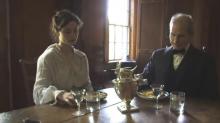 Summer
Summer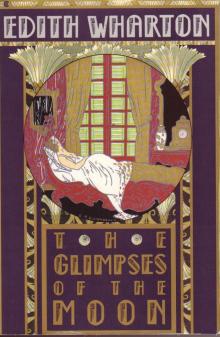 The Glimpses of the Moon
The Glimpses of the Moon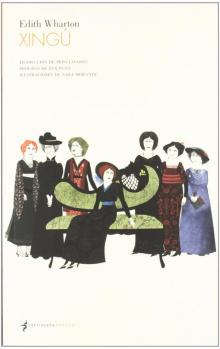 Xingu
Xingu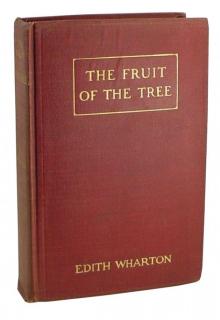 The Fruit of the Tree
The Fruit of the Tree Fast and Loose
Fast and Loose Artemis to Actaeon and Other Verse
Artemis to Actaeon and Other Verse The Line of Least Resistance
The Line of Least Resistance The Lamp of Psyche
The Lamp of Psyche The Reckoning
The Reckoning Afterward
Afterward The New York Stories of Edith Wharton
The New York Stories of Edith Wharton The 2014 Halloween Horrors Megapack
The 2014 Halloween Horrors Megapack 'Copy': A Dialogue
'Copy': A Dialogue The Recovery
The Recovery The Fulness of Life
The Fulness of Life Early Short Stories Vol. 1
Early Short Stories Vol. 1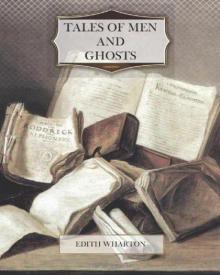 Tales of Men and Ghosts
Tales of Men and Ghosts The House of the Dead Hand
The House of the Dead Hand That Good May Come
That Good May Come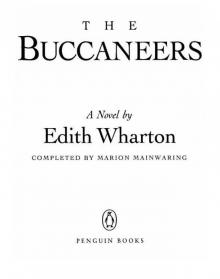 The Buccaneers
The Buccaneers Other Times, Other Manners
Other Times, Other Manners The Hermit and the Wild Woman
The Hermit and the Wild Woman Kerfol
Kerfol The Duchess at Prayer
The Duchess at Prayer Bunner Sisters
Bunner Sisters The Choice
The Choice Madame De Treymes
Madame De Treymes Ethan Frome, Summer, Bunner Sisters
Ethan Frome, Summer, Bunner Sisters In Morocco
In Morocco The Valley of Decision
The Valley of Decision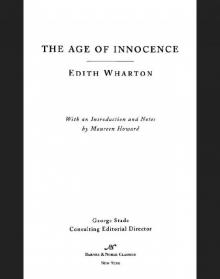 Age of Innocence (Barnes & Noble Classics Series)
Age of Innocence (Barnes & Noble Classics Series) The Angel at the Grave
The Angel at the Grave April Showers
April Showers Sanctuary
Sanctuary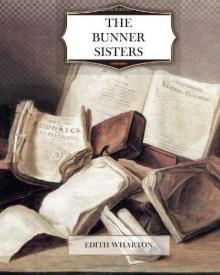 The Bunner Sisters
The Bunner Sisters Mrs. Manstey's View
Mrs. Manstey's View Writing a War Story
Writing a War Story The Custom of the Country
The Custom of the Country In Trust
In Trust The Triumph of the Night
The Triumph of the Night The Hermit and the Wild Woman, and Other Stories
The Hermit and the Wild Woman, and Other Stories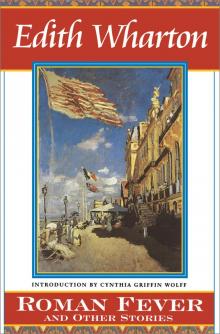 Roman Fever and Other Stories
Roman Fever and Other Stories The Mission of Jane
The Mission of Jane The Descent of Man and Other Stories
The Descent of Man and Other Stories Coming Home
Coming Home The Touchstone
The Touchstone Early Short Stories Vol. 2
Early Short Stories Vol. 2 Edith Wharton's Verse, 1879-1919, from various journals.
Edith Wharton's Verse, 1879-1919, from various journals.